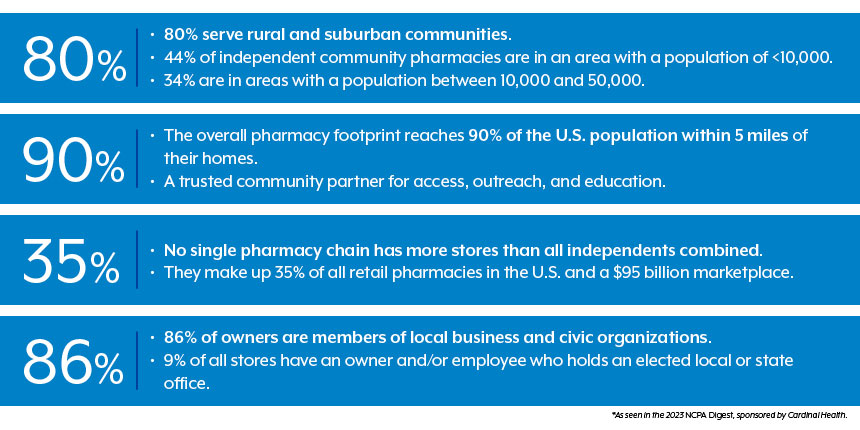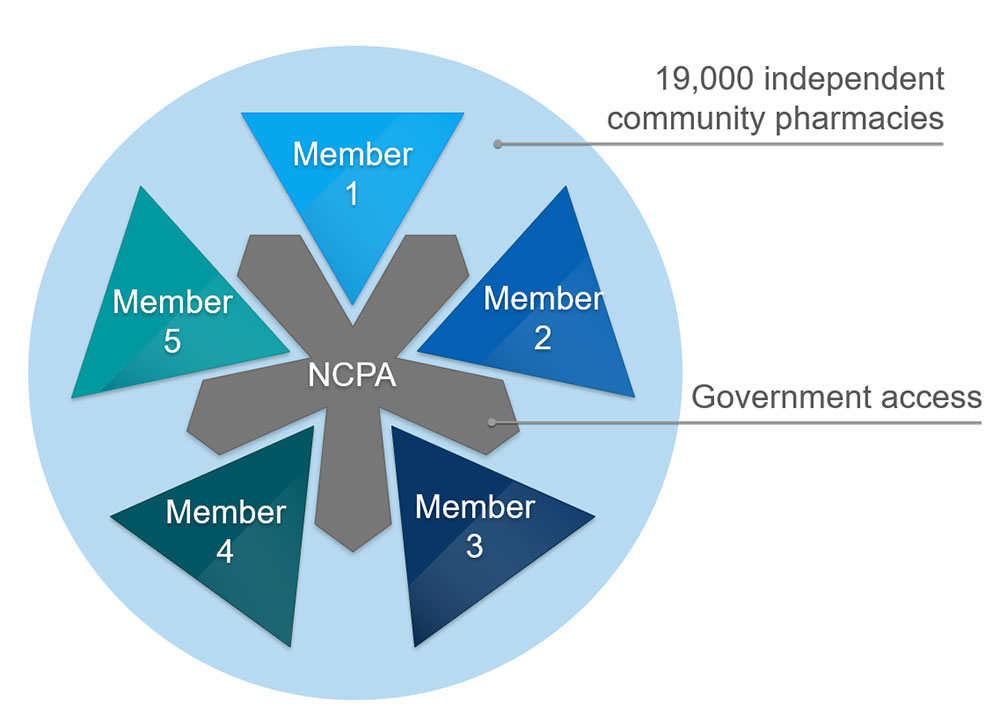Independent Community Pharmacy Consortium
for Government Engagement
This groundbreaking network is a structure to reach and engage the nearly 19,000 independent community pharmacies to swiftly and efficiently respond during a public health emergency (PHE) or other needed emergency response. Led by the NCPA Innovation Center and involving pharmacy services administrative organizations, wholesale distributors and pharmacy management system vendors, the Independent Community Pharmacy Consortium for Government Engagement serves as a single, initial representative point of contact between the parties and government officials. It builds on the vital role independent pharmacies played during the COVID-19 pandemic, and it is especially crucial for ensuring access to health care, pharmacy, and public health services for the most vulnerable populations in both rural and urban settings in future PHEs.
Community pharmacies support local, state, and national resiliency.
Independent community pharmacies support local,
state, and national resiliency and are active in responses.

Recommended actions based on learnings from COVID-19 pandemic
-
AGREEMENTS TAILORED FOR INDEPENDENT PHARMACY AGGREGATORS
Define roles and clarify responsibilities of pharmacy aggregators and independent community pharmacies as different than chain pharmacy company structures for future agreements between government agencies and independent community pharmacy aggregators.
Consider establishing a long-term agreement now, with the ability to add an addendum for a public health emergency activation for ease of rapid activation and pre-established expectations of each partner. This includes aiming for unified health agreements with organizations such as ASPR, CDC, CMS, and state and local governments.
-
FUNDED AGREEMENTS
Explore alternatives for successful contracting with independent community pharmacy aggregators during a response to follow to the spirit of the Simplified Acquisition subsection of the Federal Acquisition Regulation (FAR) for services, acknowledging small business capabilities for data management and protecting the American public.
Add separate cost reimbursement strategies for every additional activity requested. This should include training, process management, providing data to government agencies, and distribution of ancillary products. Financial support / grants should be available to providers and aggregators to support necessary data sharing and reporting requirements, as well.
The next agreements can incentivize long-term participation through funded agreements with clear deliverables.
-
STREAMLINED REPORTING
Consider policies and cost-saving processes for a single data input feeding multiple systems. Most pharmacies now connect to the state Immunization Information Systems (IIS) through more than 40 prescription management systems across the country, which could inform the other tools and systems across government, with agreement between state and federal agencies.
Clarify independent pharmacy responsibilities for reporting to the streamlined data system. This will improve data compliance for ordering, countermeasure delivery, waste, and even tracking pharmacy closures. The Consortium can work with government agencies now to develop strategies, data architecture, and standardized nomenclature including NCPDP data fields.
Establish countermeasure reconciliation reporting plans with independent community pharmacy aggregators before the next emergency. Through these partners’ insights, reporting can be less burdensome on independent pharmacies that may order countermeasures using either a state or federal PIN.
Provision of clear, concise, and consistent messaging for providers and clinical data to ensure provider and public understanding of the recommendations. This will help pharmacists educate patients and streamline clinical trainings.
-
SUSTAINED PARTNERSHIPS
Federal, state, and local public health and response agencies can identify the independent pharmacies and PSAO networks in their communities now, including contact lists. Lasting relationships will require committed staff and teams.
Engage independent pharmacies and PSAOs for chronic condition maintenance and other non-emergent public health activities. The best way to leverage a group during a PHE is to establish projects in areas other than a response.
Include independent pharmacies and PSAOs in local, state, and federal public health emergency planning and exercising to ensure the public health network involves pharmacists early to maintain the relationships developed during COVID-19. Independent pharmacies have the broadest reach geographically, trust in communities, and access to underserved populations.
|
|
AlignRx |
Cardinal Health |
Cencora |
|
Epic |
McKesson |
Morris & Dickson |
Pharmacy First |
For more information or to contact/join/support the Consortium, please email us here: [email protected]
